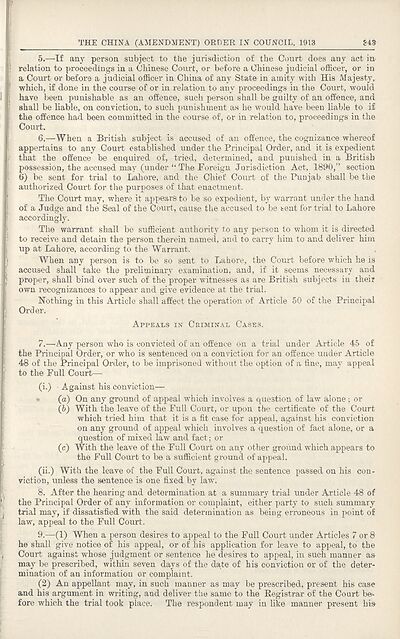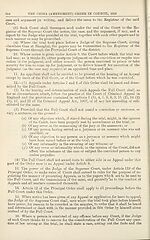1924
(399) Page 343
Download files
Complete book:
Individual page:
Thumbnail gallery: Grid view | List view

THE CHINA (AMENDMENT) ORDER IN COUNCIL, 1913 S43
5. —If any person subject to the jurisdiction of the Court does any act in
relation to proceedings in a Chinese Court, or before a Chinese judicial officer, or in
a Court or before a judicial officer in China of any State in amity with His Majesty,,
which, if done in the course of or in relation to any proceedings in the Court, would
have been punishable as an offence, such person shall be guilty of an offence, and
shall be liable, on conviction, to such punishment as he would have been liable to if
the offence had been committed in the course of, or in relation to, proceedings in the
Court.
6. —When a British subject is accused of an offence, the cognizance whereof
appertains to any Court established under the Principal Order, and it is expedient
that the offence be enquired of, tried, determined, and punished in a British
possession, the accused may (under “ The Foreign Jurisdiction Act, 1890,” section
6) be sent for trial to Lahore, and the Chief Court of the Punjab shall be the
authorized Court for the purposes of that enactment.
The Court may, where it appears to be so expedient, by warrant under the hand
of a Judge and the Seal of the Court, cause the accused to be sent for trial to Lahore
accordingly.
The warrant shall be sufficient authority to any person to whom it is directed
to receive and detain the person therein named, and to carry him to and deliver him
up at Lahore, according to the Warrant.
When any person is to be so sent to Lahore, the Court before which he is
accused shall take the preliminary examination, and, if it seems necessary and
proper, shall bind over such of the proper witnesses as are British subjects in their
own recognizances to appear and give evidence at the trial.
Nothing in this Article shall affect the operation of Article 50 of the Principal
Order.
Appeals in Criminal Cases.
7. —Any person who is convicted of an offence on a trial under Article 45 of
the Principal Order, or who is sentenced on a conviction for an offence under Article
48 of the Principal Order, to be imprisoned without the option of a tine, may appeal
to the Full Court—
(i.) - Against his conviction—
* (a) On any ground of appeal which involves a question of law alone; or
(b) With the leave of the Full Court, or upon the certificate of the Court
which tried him that it is a fit case for appeal, against his conviction
on any ground of appeal -which involves a question of fact alone, or a
question of mixed law and fact; or
(c) With the leave of the Full Court on any other ground which appears to
the Full Court to be a sufficient ground of appeal.
(ii.) With the leave of the Full Court, against the sentence passed on his con¬
viction, unless the sentence is one fixed by law.
8. After the hearing and determination at a summary trial under Article 48 of
the Principal Order of any information or complaint, either party to such summary
trial may, if dissatisfied with the said determination as being erroneous in point of
law, appeal to the Full Court.
9. —(1) When a person desires to appeal to the Full Court under Articles 7 or 8
he shall give notice of his appeal, or of his application for leave to appeal, to the
Court against whose judgment or sentence he desires to appeal, in such manner as-
may be prescribed, within seven days of the date of his conviction or of the deter¬
mination of an information or complaint.
(2) An appellant may, in such manner as may be prescribed, present bis case
and his argument in writing, and deliver tbe same to the Registrar of the Court be¬
fore which the trial took place. The respondent may in like manner present his-
5. —If any person subject to the jurisdiction of the Court does any act in
relation to proceedings in a Chinese Court, or before a Chinese judicial officer, or in
a Court or before a judicial officer in China of any State in amity with His Majesty,,
which, if done in the course of or in relation to any proceedings in the Court, would
have been punishable as an offence, such person shall be guilty of an offence, and
shall be liable, on conviction, to such punishment as he would have been liable to if
the offence had been committed in the course of, or in relation to, proceedings in the
Court.
6. —When a British subject is accused of an offence, the cognizance whereof
appertains to any Court established under the Principal Order, and it is expedient
that the offence be enquired of, tried, determined, and punished in a British
possession, the accused may (under “ The Foreign Jurisdiction Act, 1890,” section
6) be sent for trial to Lahore, and the Chief Court of the Punjab shall be the
authorized Court for the purposes of that enactment.
The Court may, where it appears to be so expedient, by warrant under the hand
of a Judge and the Seal of the Court, cause the accused to be sent for trial to Lahore
accordingly.
The warrant shall be sufficient authority to any person to whom it is directed
to receive and detain the person therein named, and to carry him to and deliver him
up at Lahore, according to the Warrant.
When any person is to be so sent to Lahore, the Court before which he is
accused shall take the preliminary examination, and, if it seems necessary and
proper, shall bind over such of the proper witnesses as are British subjects in their
own recognizances to appear and give evidence at the trial.
Nothing in this Article shall affect the operation of Article 50 of the Principal
Order.
Appeals in Criminal Cases.
7. —Any person who is convicted of an offence on a trial under Article 45 of
the Principal Order, or who is sentenced on a conviction for an offence under Article
48 of the Principal Order, to be imprisoned without the option of a tine, may appeal
to the Full Court—
(i.) - Against his conviction—
* (a) On any ground of appeal which involves a question of law alone; or
(b) With the leave of the Full Court, or upon the certificate of the Court
which tried him that it is a fit case for appeal, against his conviction
on any ground of appeal -which involves a question of fact alone, or a
question of mixed law and fact; or
(c) With the leave of the Full Court on any other ground which appears to
the Full Court to be a sufficient ground of appeal.
(ii.) With the leave of the Full Court, against the sentence passed on his con¬
viction, unless the sentence is one fixed by law.
8. After the hearing and determination at a summary trial under Article 48 of
the Principal Order of any information or complaint, either party to such summary
trial may, if dissatisfied with the said determination as being erroneous in point of
law, appeal to the Full Court.
9. —(1) When a person desires to appeal to the Full Court under Articles 7 or 8
he shall give notice of his appeal, or of his application for leave to appeal, to the
Court against whose judgment or sentence he desires to appeal, in such manner as-
may be prescribed, within seven days of the date of his conviction or of the deter¬
mination of an information or complaint.
(2) An appellant may, in such manner as may be prescribed, present bis case
and his argument in writing, and deliver tbe same to the Registrar of the Court be¬
fore which the trial took place. The respondent may in like manner present his-
Set display mode to:
![]() Universal Viewer |
Universal Viewer | ![]() Mirador |
Large image | Transcription
Mirador |
Large image | Transcription
Images and transcriptions on this page, including medium image downloads, may be used under the Creative Commons Attribution 4.0 International Licence unless otherwise stated. ![]()
| Asian directories and chronicles > 1924 > (399) Page 343 |
|---|
| Permanent URL | https://digital.nls.uk/196429096 |
|---|
| Attribution and copyright: |
|
|---|---|
| Description | Volumes from the Asian 'Directory and Chronicle' series covering 1917-1941, but missing 1919 and 1923. Compiled annually from a multiplicity of local sources and research. They provide listings of each country's active corporations, foreign residents and government agencies of all nationalities for that year, together with their addresses. Content includes: various treaties; coverage of conflicts; currencies and taxes; consular fees; weights and measures; public holidays; festivals and traditions. A source of information for both Western states and communities of foreigners living in Asia. Published by Hongkong Daily Press. |
|---|---|
| Shelfmark | H3.86.1303 |
| Additional NLS resources: |
![[Page 342]China (Amendment) Order in Council, 1913](https://deriv.nls.uk/dcn4/1964/2908/196429085.4.jpg)
